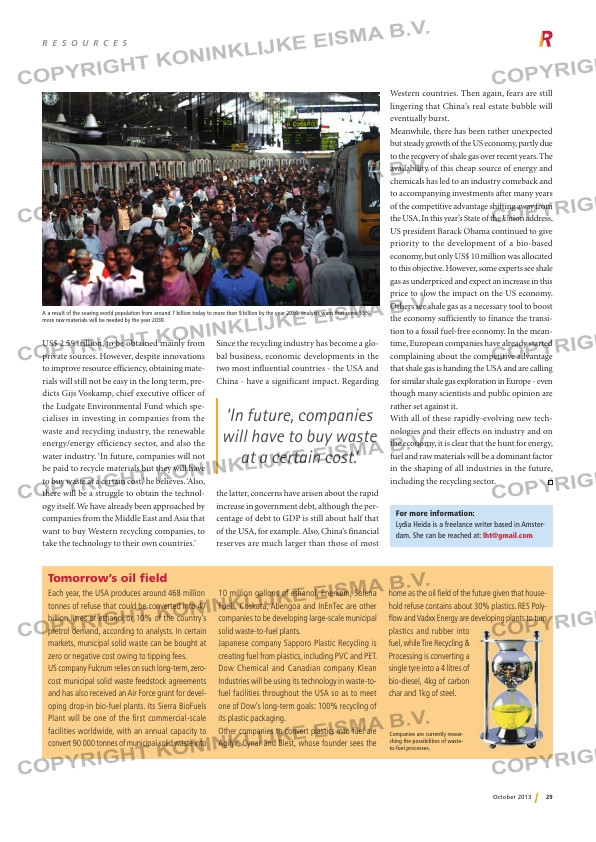Page 29 from: October 2013

29October 2013
US$ 2.59 trillion, to be obtained mainly from
private sources. However, despite innovations
to improve resource efficiency, obtaining mate-
rials will still not be easy in the long term, pre-
dicts Gijs Voskamp, chief executive officer of
the Ludgate Environmental Fund which spe-
cialises in investing in companies from the
waste and recycling industry, the renewable
energy/energy efficiency sector, and also the
water industry. ‘In future, companies will not
be paid to recycle materials but they will have
to buy waste at a certain cost,’ he believes. ‘Also,
there will be a struggle to obtain the technol-
ogy itself. We have already been approached by
companies from the Middle East and Asia that
want to buy Western recycling companies, to
take the technology to their own countries.’
Since the recycling industry has become a glo-
bal business, economic developments in the
two most influential countries – the USA and
China – have a significant impact. Regarding
the latter, concerns have arisen about the rapid
increase in government debt, although the per-
centage of debt to GDP is still about half that
of the USA, for example. Also, China’s financial
reserves are much larger than those of most
Western countries. Then again, fears are still
lingering that China’s real estate bubble will
eventually burst.
Meanwhile, there has been rather unexpected
but steady growth of the US economy, partly due
to the recovery of shale gas over recent years. The
availability of this cheap source of energy and
chemicals has led to an industry comeback and
to accompanying investments after many years
of the competitive advantage shifting away from
the USA. In this year’s State of the Union address,
US president Barack Obama continued to give
priority to the development of a bio-based
economy, but only US$ 10 million was allocated
to this objective. However, some experts see shale
gas as underpriced and expect an increase in this
price to slow the impact on the US economy.
Others see shale gas as a necessary tool to boost
the economy sufficiently to finance the transi-
tion to a fossil fuel-free economy. In the mean-
time, European companies have already started
complaining about the competitive advantage
that shale gas is handing the USA and are calling
for similar shale gas exploration in Europe – even
though many scientists and public opinion are
rather set against it.
With all of these rapidly-evolving new tech-
nologies and their effects on industry and on
the economy, it is clear that the hunt for energy,
fuel and raw materials will be a dominant factor
in the shaping of all industries in the future,
including the recycling sector.
R e s o u R c e s
Tomorrow’s oil fi eld
Each year, the USA produces around 468 million
tonnes of refuse that could be converted into 47
billion litres of ethanol or 10% of the country’s
pretrol demand, according to analysts. In certain
markets, municipal solid waste can be bought at
zero or negative cost owing to tipping fees.
US company Fulcrum relies on such long-term, zero-
cost municipal solid waste feedstock agreements
and has also received an Air Force grant for devel-
oping drop-in bio-fuel plants. Its Sierra BioFuels
Plant will be one of the first commercial-scale
facilities worldwide, with an annual capacity to
convert 90 000 tonnes of municipal solid waste into
10 million gallons of ethanol. Enerkem, Solena
Fuels, Coskata, Abengoa and InEnTec are other
companies to be developing large-scale municipal
solid waste-to-fuel plants.
Japanese company Sapporo Plastic Recycling is
creating fuel from plastics, including PVC and PET.
Dow Chemical and Canadian company Klean
Industries will be using its technology in waste-to-
fuel facilities throughout the USA so as to meet
one of Dow’s long-term goals: 100% recycling of
its plastic packaging.
Other companies to convert plastics into fuel are
Agilyx, Cynar and Blest, whose founder sees the
home as the oil fi eld of the future given that house-
hold refuse contains about 30% plastics. RES Poly-
fl ow and Vadxx Energy are developing plants to turn
plastics and rubber into
fuel, while Tire Recycling &
Processing is converting a
single tyre into a 4 litres of
bio-diesel, 4kg of carbon
char and 1kg of steel.
Companies are currently resear-
ching the possibilities of waste-
to-fuel processes.
For more information:
Lydia Heida is a freelance writer based in Amster-
dam. She can be reached at: [email protected]
A a result of the soaring world population from around 7 billion today to more than 9 billion by the year 2050, analysts warn that some 55%
more raw materials will be needed by the year 2030.
‘In future, companies
will have to buy waste
at a certain cost.’
p00_Recources.indd 29 03-10-13 09:54



